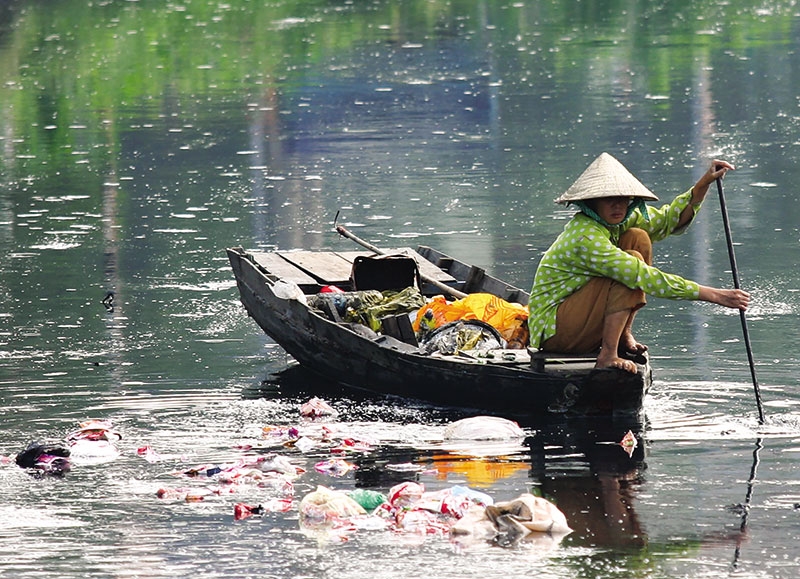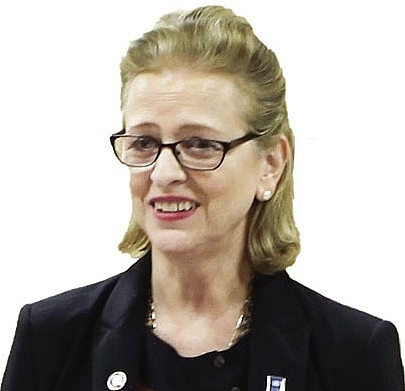Making a change in our plastic use
 |
| Vietnam is one of the greatest contributors to ocean plastic pollution Photo: Le Toan |
Caitlin Wiesen, United Nations Development Programme country director and chair of the UN Joint Result Group on Environment and Climate Change, explains how plastic pollution has affected Vietnam’s development and details some proposed solutions.
 |
“Beat Plastic Pollution”, the theme of World Environment Day 2018, urges governments, industry, communities, and individuals to break up with single-use plastic, which is not only polluting our oceans and other important ecosystems, but also damaging marine life and other wildlife, all the while also threatening human health.
Around the world, more than one million plastic drinking bottles are purchased every minute, while up to five trillion single-use plastic bags are used every year. Some 300 million tonnes of plastic are produced annually, of which 13 million tonnes leak into the ocean. It is estimated that some plastic products will retain their original, recognisable form for 400 years after their discharge into the ocean.
According to recent studies, Vietnam is among the top five polluting countries worldwide, which together contribute as much as 60 per cent of all plastic waste that enters the world’s seas.
It is encouraging that 25 embassies, together with the UN Country Team and other international organisations working in Vietnam, have come together and discussed with government ministries and the city of Hanoi a potential government policy reform on the use of plastics. The international partners also signed a joint code of conduct on plastic waste pollution, further highlighting our commitment to take concrete actions on single-use plastic and our current plastic waste footprint.
The UN in Vietnam has been working closely with the government and the Vietnamese people to promote greener, sustainable lifestyles and consumption habits. The UN supports the government of Vietnam in adopting and regularly updating key related policies, including the Law on Environmental Protection, and green growth and environment strategies and plans. Furthermore, the UN promotes important initiatives such as eco-industrial parks, green chemistry or chemical product life-cycle management, and green industry aimed toward sustainable production and industrialisation.
As an example, the UN, together with the Swedish Embassy, launched a seven-day challenge to encourage people to eat, live , and move smartly and sustainably. At the UN, we have ended using plastic bottles for meetings in the UN building and provided incubation for “Save our Oceans” – a youth startup that has designed pay-as-you-go water refill stations, using near-field communication (NFC) sticker technology, to reduce the use of plastic bottles.
Moving forward, we need more effective and faster local action, while ensuring a more coherent regional and global approach to improve environmentally effective management of the full life cycle of plastic. Here are three ways in which we can make a difference.
Firstly, there is a need to recreate or revitalise a market of environmentally friendly traditional alternatives that are locally and readily available. In the past, the Vietnamese people used banana and lotus leaves to cover their food and used fabric bags for shopping. To effectively use those traditional and simple best practices, the government should create a stronger legal framework and provide associated incentives for businesses and the private sector, who in turn can design and produce more environmentally friendly products.
Secondly, commitment and action by each individual citizen is required. Collective actions by citizens are the most powerful force to shape and drive the evolving market of environmentally friendly products. Let us start by reducing and stopping the usage of plastic bags and plastic bottles immediately and use locally made fabric bags.
Thirdly, a global or regional approach to better mitigate pollution from plastic waste is required for the full integrated life cycle. To achieve this, the government of Vietnam should initiate and lead a regional joint programme among the five countries which are significantly contributing plastic waste that is released into our oceans.
I would like to congratulate the Vietnamese government for hosting this year’s global assembly of the Global Environment Facility (GEF) in June in the central city of Danang, where marine litter and the non-sustainable use of plastic are a key topic. Held every four years, the GEF Assembly will bring together 1,000 delegates, including government leaders, UN agencies, civil society organisations, and business leaders, from more than 180 countries to discuss and share experiences, best practices, and solutions needed to protect the global environment. It will be an excellent opportunity for the government of Vietnam to successfully facilitate dialogues and identify actions to “beat plastic pollution” to achieve the Sustainable Development Goals (SDGs).
The UN Country Team will continue its close co-operation with the government and people of Vietnam, as well as development partners and other key stakeholders, in order to strengthen sustainable development and environmental protection to ensure a more sustainable future for all.
What the stars mean:
★ Poor ★ ★ Promising ★★★ Good ★★★★ Very good ★★★★★ Exceptional
Related Contents
Latest News
More News
- Congratulations from VFF Central Committee's int’l partners to 14th National Party Congress (January 25, 2026 | 09:46)
- List of newly-elected members of 14th Political Bureau announced (January 23, 2026 | 16:27)
- 14th Party Central Committee unanimously elects To Lam as General Secretary (January 23, 2026 | 16:22)
- List of members of 14th Party Central Committee announced (January 23, 2026 | 09:12)
- Highlights of fourth working day of 14th National Party Congress (January 23, 2026 | 09:06)
- Press provides timely, accurate coverage of 14th National Party Congress (January 22, 2026 | 09:49)
- Press release on second working day of 14th National Party Congress (January 22, 2026 | 09:19)
- Minister sets out key directions to promote intrinsic strength of Vietnamese culture (January 22, 2026 | 09:16)
- 14th National Party Congress: Renewed momentum for OVs to contribute to homeland (January 21, 2026 | 09:49)
- Party Congress building momentum for a new era of national growth (January 20, 2026 | 15:00)

 Tag:
Tag:




















 Mobile Version
Mobile Version